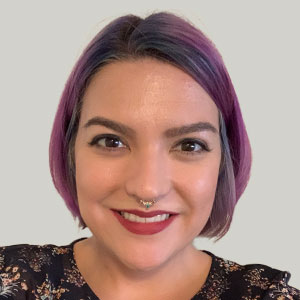Meet Ahna Skop
When Ahna Skop talks to youngsters about science careers, she makes a point to illustrate how science is used by people in all sorts of professions. Hair stylists, for example, she calls “hair biochemists.”

“When I do outreach and the kids see me as a scientist, that’s the kicker. It’s the moment they get exposed to the idea that women and fun people are scientists too,” Skop said.
Skop, a full professor of genetics at the University of Wisconsin–Madison, is a champion for diversity and inclusion in science, technology, engineering and math fields.
“My parents were dedicated to mentoring and helping others, so it’s part of who I am and has been my whole life,” Skop said.
Skop grew up in Connecticut and Northern Kentucky in a family of artists. Her father was classically trained, taught anatomy and operated an art school from their childhood home. Her mother was a high school art educator who engaged in ceramics and fiber arts.
Skop earned her bachelor’s degree in biology, with a minor in ceramics, at Syracuse University and her Ph.D. in cell and molecular biology at UW–Madison.
Her lab uses mammalian tissue culture and C. elegans to elucidate the mechanisms of asymmetric cell division, with a particular emphasis on the newly defined signaling organelle called the midbody. She is also an affiliate faculty member in both the Department of Life Sciences Communication and the Division of the Arts.
“Growing up surrounded by art, I saw that science was everywhere,” Skop said. “Science is not different from life; it is life.”
Skop said that her experiences with dyslexia and Ehlers–Danlos syndrome have instilled in her the values of empathy and understanding and have shaped her approaches to education and inclusion. She said she tries to bring her whole self into the classroom, leveraging her background and personal experiences to promote inclusive learning environments.
“Ahna really embraces each person’s individuality and uplifts you,” said longtime friend, colleague and collaborator Diana Chu, a professor at San Francisco University, “Sometimes I think that’s the best thing, when someone sees you and is genuinely excited for you.”

Skop’s efforts have been recognized many times over. In 2018, she was the inaugural recipient of the American Society for Cell Biology’s Prize for Excellence in Inclusivity, and she was selected in 2019 to be a member of the American Association for the Advancement of Science IF/THEN Ambassadors Program.
Skop is an advocate for teaching allyship and advocacy at a young age. She recently released a book called “Genetic Reflections: A Coloring Book,” which she published with undergraduate genetics students in her lab.
A hobby cook and baker, she has for years run a food blog (foodskop.com) that chronicles her adventures in the kitchen and on her many travels. More recently, she developed with colleagues a website (LabCultureRecipes.com) that humanizes scientists with profiles, personal essays and recipes for favorite dishes with funding from the AAAS IF/THEN initiative.
“Many young students and the public never hear about our passions outside of science,” Skop wrote on the website. “With Lab Culture, we have the opportunity to connect with the public through our shared cultures, childhood memories, career paths, personal stories, and food — and, through this, we can come to recognize how similar we are to each other.”
Author’s note
Feb. 11 marked the International Day of Women and Girls in Science.
Throughout history, women have advanced the fields of science, technology, engineering and math, shaping and improving the world around us.
For example, the luxury of global navigation is available because of the work of Gladys West, and the material Kevlar, used widely by law enforcement, was created by Stephanie Kwolek.
The successes of these women were the result of grit and perseverance; however, the continued success of women and girls in STEM requires advocacy, allyship and support, both in the lab and the classroom.
Enjoy reading ASBMB Today?
Become a member to receive the print edition four times a year and the digital edition monthly.
Learn moreGet the latest from ASBMB Today
Enter your email address, and we’ll send you a weekly email with recent articles, interviews and more.
Latest in People
People highlights or most popular articles

Simcox wins SACNAS mentorship award
She was recognized for her sustained excellence in mentorship and was honored at SACNAS’ 2025 National Conference.

From humble beginnings to unlocking lysosomal secrets
Monther Abu–Remaileh will receive the ASBMB’s 2026 Walter A. Shaw Young Investigator Award in Lipid Research at the ASBMB Annual Meeting, March 7-10 in Washington, D.C.

Chemistry meets biology to thwart parasites
Margaret Phillips will receive the Alice and C. C. Wang Award in Molecular Parasitology at the ASBMB Annual Meeting, March 7-10 in Washington, D.C.

ASBMB announces 2026 JBC/Tabor awardees
The seven awardees are first authors of outstanding papers published in 2025 in the Journal of Biological Chemistry.

Decoding how bacteria flip host’s molecular switches
Kim Orth will receive the Earl and Thressa Stadtman Distinguished Scientists Award at the ASBMB Annual Meeting, March 7–10, just outside of Washington, D.C.

Thiam elected to EMBO
He was recognized during the EMBO Members’ Meeting in Heidelberg, Germany, in October.


